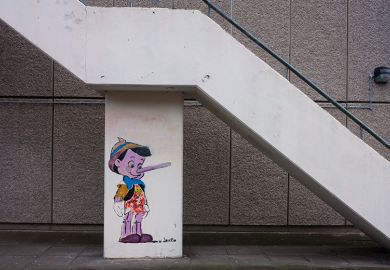Here’s a counterfactual: if this book were less good, it would be easier to review.
In that conditional sentence, the “protasis” is the “if…” and the consequence is the “adoposis”. This basic frame, Christopher Prendergast claims, underlies all counterfactuals. But this isn’t the core of his real interest. Nor is his main aim to show the variety and range of counterfactuals, although, with a light and charming touch, this astonishingly erudite book does that in abundance. At its core, it is aiming at something else, something profounder.
Counterfactuals are not lies (also known as “alternative facts”) nor fiction (they are “what-ifs”, not fiction’s “as-ifs”). Rather, they complement a sense of the world and its history. In Telling It Like It Wasn’t: The Counterfactual Imagination in History and Fiction (2018), Catherine Gallagher traces the origins of counterfactuals from antiquity, but argues that their growth as a method stems from their use in military history and training in the 19th century. With the (relatively) quantifiable factors at play on a battlefield, they focused attention on the command choices, territory and troop conditions. Using counterfactuals to “test causal explanations of what actually happened”, as Prendergast puts it, has spread more widely into the discipline of history – and not only as a salutary reminder that, as Hugh Trevor-Roper said, “history is not merely what happened: it is what happened in the context of what might have happened”. In philosophy, counterfactuals provide thought experiments, and (as might be expected) have turned out to be quite complex, interesting and problematic forms of language use in their own right. But, while touching on all these, Prendergast’s deeper aim is to understand the role counterfactuals play existentially, in our human lives through history: the book is as much about choices as counterfactuals. Considering the (counterfactual) road not taken shows us the road we’re on.
Prendergast’s method is to place under intense intellectual scrutiny an astonishing range of thinkers, writers, artists, events and concepts, and, through examination and juxtaposition, draw out his conclusions. This is at its clearest in the bravura central chapter, on choices, understood as “crossroads”. Prendergast chooses three emblematic examples, all under the sign of the Greek letter upsilon, “Y”. (Why? Because this letter in itself represents two roads diverging, or three meeting: the need for a choice.)
The first is Oedipus – his story contains plenty of “what ifs”: what if he had died as a baby, abandoned on the hillside? What if he had listened to those warning him of disaster? Prendergast argues that these are less “what ifs” and more “if onlys”. This is what Bernard Williams – a touchstone thinker throughout the book – calls the classical Greek “sense of prearranged necessity”. For the characters in classical tragedy, the appearance of choice, in counterfactuals, shows fate only as more inexorable, and the meaning more paradoxical.
The second crossroads is that of Petrarch in “The Ascent to Mont Ventoux” (I’d never come across this, but the miracle of the internet meant I could read it while commuting: it’s funny, beautiful and melancholy). Allegedly, in 1336, Petrarch and his brother climbed the mountain just for the view, the first to do this – some scholars maintain – since classical antiquity. But since the account is written to his (in fact, deceased) confessor, the climb is also a moral one, choosing between the hard path of virtue and the easy path of vice: while “my brother chose a direct path straight up the ridge, I weakly took an easier one which really descended”. He finds himself in gullies and dead ends on the mountain and in life. And when he finally reaches the summit, he opens his copy of St Augustine’s Confessions randomly, as Augustine had done with the Bible at his point of conversion: it’s a passage that condemns earthly wonders, including mountain peaks (“this is the stress point of credibility,” writes Prendergast). Petrarch descends quietly in contemplation of his own internal self, without reaching a conclusion about his spiritual path. Prendergast regards this, “the doubting subject lost in an endless soliloquy”, as a moment of modernity – and indeed scholars have seen Petrarch in this emblematic moment suspended, as it were, in choice between the modern and medieval worlds. Here, the counterfactuals seem to force him into a new internal formation.
The final crossroads is that of Ignatius of Loyola. Travelling to Montserrat to take Holy Orders, he gets into a complex argument with a “Saracen” over the theological matter of Mary’s virginity. The Saracen rides on and turns off to a town, and Ignatius – still nominally a soldier – tussles with himself over whether he should pursue and kill him (a Christian warrior avenging an insult to the Blessed Virgin) or not. He can’t decide, so puts himself in the hands of providence by giving his horse free rein. (The horse, or providence, decides to keep on the main road, luckily for everyone involved.) In this last example, the play of “what ifs” becomes part of Ignatius’ understanding of God.
This kind of range and eye for detail characterises the whole book. The other chapters include discussions of how seriously to take counterfactuals, their relationship to facts, forms of “experimental history” and forms of regret (about the road, or the road not taken). They also feature accounts of Walter Benjamin and Fernando Pessoa and, in passing, 19th-century racehorses, Norman Lamont, angels, notions of regret in 13th-century Mongolian culture, the beauty of geometry and more. This exuberance does lead, sometimes, to a diffusion of focus, but with the very discursive footnotes, it means that much of the pleasure of Counterfactuals is in the journey, and especially in looking down the many possible forking paths, and not only in the destination. Some of the juxtapositions are delightful: the wisdom of Dionysus’ companion Silenus who, caught and pressed to say what is best for man, famously declared that “the very best thing is utterly beyond your reach: not to have been born” (a counterfactual we can only contemplate) is opposed to the wisdom of Clarence, the trainee angel from Frank Capra’s film It’s a Wonderful Life (1946), who offers the suicidal George a counterfactual vision of Bedford Falls in which he had not been born.
This range leads to a question: if this book was written for a specific discipline, which would it be? Prendergast, general editor of Penguin’s translation of Proust’s A la recherche du temps perdu, specialises in French literature and cultural history. But this book isn’t just for those in modern languages. It addresses much of interest for historians and classicists, and – in its exemplary interweaving of the literary and the philosophical – much for literary critics and philosophers too. It’s quite rare to come across a book like this which is, quite simply, for the humanities. If we imagine a world where this book had no audience, where, say, the meanings of Petrarch’s climb and Ignatius’ indecision were forgotten, it would be a much colder and less wise one.
Robert Eaglestone is professor of contemporary literature and thought at Royal Holloway, University of London. His books include The Broken Voice: Reading Post-Holocaust Literature (2017)
Counterfactuals: Paths of the Might Have Been
By Christopher Prendergast
Bloomsbury Academic
272pp, £65.00 and £19.99
ISBN 9781350090088 and 9781350090095
Published 4 April 2019
The author
Christopher Prendergast, emeritus professor of French at the University of Cambridge, describes himself as “born in Belfast of Dubliner parents” but he moved to England as a child and was largely brought up in London. Although he studied French and German at Oxford, he had “really wanted to do philosophy”, until “a quick look at induction by way of symbolic logic switched me off. However, I have never lost my interest in philosophy along with my admiration for it, sometimes verging on reverence, as the prince of the disciplines.”
Along with editing the Penguin translation of Proust and studies of classic French literature, Prendergast has also ranged more widely. For five years, he recalls, he “taught at the graduate school of the City University of New York…at a time when ‘going global’ was very much the thing”. This led to a co-edited anthology known as The Harper Collins World Reader (1994). He has also published books on Napoleonic history painting and the Storming of the Bastille.
So what is the appeal of the seemingly abstract topic of counterfactuals?
“They have an immense part to play in a variety of disciplines (philosophy, natural sciences and social sciences),” responds Prendergast. “In particular, they have a special function in the stress-testing of causal explanations. They are of course also controversial, most notably in the discipline of history, though…polemical fever can all too easily usurp rational argument. In the wider human sphere, counterfactuals are also something of a mixed bag, on a spectrum from a genuinely reflective take on how the life lived might have been lived otherwise, to the nauseously self-pitying counterfactual lamentations of the ‘if only’. But, as I say in the book, show me a human being who has never entertained a counterfactual thought, and I’ll show you a dead one.”
Matthew Reisz
POSTSCRIPT:
Print headline: What if? Choices we don’t make
Register to continue
Why register?
- Registration is free and only takes a moment
- Once registered, you can read 3 articles a month
- Sign up for our newsletter
Subscribe
Or subscribe for unlimited access to:
- Unlimited access to news, views, insights & reviews
- Digital editions
- Digital access to THE’s university and college rankings analysis
Already registered or a current subscriber?


